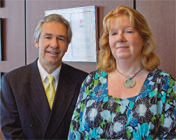Drew Parker Featured In Illinois Leading Lawyers Article
Thu 5 Feb, 2015 / by Parker and Parker / General

Written by Melissa Birks: There was the opposing attorney who refused to shake hands with him. There was his own client who, unbeknownst to him, collected her blood into a glass vial that she smuggled into the courthouse and pitched like a hand grenade onto her husband as their divorce case ended.
For Drew Parker, those stories represent the nadir in the difficult practice of family law. Handling almost exclusively high-end divorces with clients who typically have more than $1 million in assets, Parker recognizes that the practice can easily disintegrate into posturing dramatics.
Despite that tendency, or perhaps because of it, Parker uses language like “civility,” “diplomat,” and “sense of humor” to describe his approach. “We need less brutality,” he says. “Any jerk can be loud and mean to the other party, to the other lawyer. We degrade ourselves, our profession, and the entire court system if we do that. It takes more finesse and talent to be diplomatic than to revert to obnoxiousness.”
Judge James E. Shadid, whose first assignment was on the family law court when he became a judge in 2001, says he’s impressed with Parker’s willingness to sit down with all the parties to resolve issues before going to trial.
“Many in the divorce courts just want the fight,” Shadid says, “and even though Drew is very capable in a fight, it is generally in the client’s best interest to have their issues resolved and allow them to move on with their lives.”
Parker, 56, didn’t always focus on divorce cases but today finds himself comfortably embedded in the niche at Parker and Halliday, the firm he founded in 1980 with Ronald Halliday. Fifteen or 20 years ago, their practice leaned more heavily on criminal cases. Over time, the public defender’s office in Peoria County began getting appointed to more cases and, Parker says, lawyers in the private bar were free to reach into other fields.
“About that time, fortunately, my practice was going divorce,” Parker says. “My partner loved the personal injury work; he had to drag me kicking and screaming into TV advertisements.”
In today’s divorce-ready climate, of course, Parker isn’t necessarily lacking for clients. Such a climate may be good for business, but the propensity to end marriages before trying alternatives like counseling disturbs him.
“When you don’t even want to try marriage counseling; when you’re coming in and saying, ‘I want my freedom. I want to go out at night with my friends’ and you have a 3-year-old at home; when you decide, ‘I’m not happy’-I find that appalling.”
While Parker’s practice has developed over the years, his style and demeanor have remained unfailing, according to Judge Scott A. Shore, who has worked with Parker throughout his 17-some years on the bench.
“I would say there’s an amazing consistency to his method of practicing law, efficiently and effectively,” Shore says. “That’s one of the reasons I say it the way I do, that Drew exemplifies the finest qualities of an excellent domestic relations bar. I think he demonstrates those qualities we hope to inspire in young lawyers and appreciate in experienced lawyers.”
 At least one person would say that she’s seen Parker evolve with experience, and she should know. Denice Pennington has been Parker’s secretary since the three of them- Parker, Halliday and Pennington-opened up shop 28 years ago. The partners were 28 years old at the time; she, five years younger.
At least one person would say that she’s seen Parker evolve with experience, and she should know. Denice Pennington has been Parker’s secretary since the three of them- Parker, Halliday and Pennington-opened up shop 28 years ago. The partners were 28 years old at the time; she, five years younger.
“As younger attorney, I think he wanted to get the job done and move on. I just think he has more empathy for their situation now,” Pennington recalls. “He has gotten more in tune with clients. It’s like, when you’re younger, things just roll off you more. I think as you get older, you start appreciating things; you finally understand. ‘Oh, now I understand what my folks were talking about.'”
In 1980, Pennington was a secretary at the firm where Halliday worked as an associate. When he decided to branch out, she followed. She didn’t know Parker until Halliday introduced her. Today, the firm has only one more employee, a personal secretary to Halliday. To Pennington, they are more like a family than office colleagues.
Like family, she can rib him for his “awful” handwriting, and he has license to point out when she makes the coffee too strong. The firm’s family element is expected to grow even more when Parker’s son, Rob, joins the firm after graduating from St. Louis University Law School.
The fact that Pennington has stayed for so long, she says, is a testament to Parker.
“I have to attribute it to the fact that he’s a great boss. Why else would I stay if I weren’t treated well and with respect?”
‘We Have to Rise Above That’
Treating people well and with respect extends to the county’s bench and bar, says Parker, who praises the courtroom community for being among the friendliest in the state.
“We’re gifted in that respect,” he says.
Shore agrees, speaking from the bench. “We’re thankful to have a great relationship with the bar association, and Drew fosters that relationship.”
Still, Parker believes that the industry as a whole “hit a low point” in civility a few years ago and is only now emerging from that abyss.
“Sometimes, what I’m seeing in a lot of divorce cases, young lawyers are getting enmeshed in the emotional drama. They’re getting immersed themselves,” he says. “That’s a big mistake. We have to rise above that.”
Parker and his first wife, also a lawyer, vowed not to descend into destructive patterns when they divorced. They resolved their parting without outside representation, and he and his current wife remain friends with his first wife and her husband.
“We were determined not to end up like our clients,” he says.
Further, he’s disappointed when he sees young associates gritting their teeth on the job, going into court with the uncomfortable intensity of a dentist appointment. He can’t relate; he wanted to be a lawyer since around age 8 and, to this day, he says, “some of the most interesting times in my life have been in the courtroom.”
After graduating from the Chicago-Kent College of Law, Parker worked as an assistant public defender for both Cook and Peoria counties, and then as an assistant state’s attorney for Peoria County before opening Parker and Halliday.
Parker prefers the courtroom to reading files in his office. He thrives on the theater of the cross examination. He cherishes the stories that never lose their comic edge, like the tale he still tells from his days working criminal cases long ago.
He represented a man caught with heroin stashed under his hat. Take a plea, Parker counseled. No, the client said, maintaining that his wife planted the drugs. Like something out of a Greek myth or a TV courtroom drama, a process server materialized one day during a recess in the jury trial to deliver divorce papers. Parker introduced the divorce papers to the jury, indicating a motive for his client’s wife to plant the heroin. He walked out of the courtroom a free man.
“That’s what’s fun about the court,” Parker says. “That type of thing doesn’t happen every day. Every single day, the job is interesting.”
His clientele today includes small business owners, other lawyers, and doctors who work at nearby University of Illinois medical school. Practicing family law makes Parker feel like he’s helping people. He strives to keep a steady dose of humor on hand. If he can get a client to break into a smile, he says, “it really helps a lot.”
“I’m seeing people at their worst. People can come in and still smile and still laugh; I admire that. I tend to take the approach, having done criminal work, that even the other side is not criminal,” he says.
Clients may not appreciate or understand his friendliness with the other side. Parker often has to explain his methods.
“I will be nice to the other lawyer. I may even joke with the other lawyer,” he says. “When I was a young lawyer, I walked out of those meetings and the client would say, ‘Why were you so nice (to the other side)?’ I’d have to say, ‘Because I was trying to solve your case.'”
Shore sees those methods at work when Parker appears in his courtroom.
“He has an excellent demeanor and attitude in representing clients and in presenting cases in court,” Shore says. “I would say he can be an aggressive advocate but can also be understanding and accommodating to the other side. I think it’s more effective in the end in accomplishing fair and well-considered results for his own client.”
Parker’s skill, Shore says, comes from years of experience-and from other qualities as well.
“You start with a well-rounded individual who has interests in and outside of law. It starts with a person who puts the practice of law in the right perspective,” he says.
Classic Tree-Hugger
Indeed, Parker has interests outside of the law. The courtroom may provide some of the most interesting times in his life, but the 420 rural acres he owns in Knox County, between Peoria and Galesburg, provides some of the most soothing times.
About a mile-and-a-half of Spoon River shoreline touches the property that he operates as a “gentleman farmer.” If he can’t be found at work, he can often be found fishing. A scant amount of corn and soybeans have managed to stake claim in a few places. He has no livestock. Parker’s interest lies in trees. He planted 56,000 hardwoods on one portion of the property.
“I’m a classic tree-hugger,” he admits. “There’s still some acreage with corn and soybeans-some, but not much. It’s mostly either trees or prairie grass.”
Parker also built a log cabin on the site as a weekend get-away. He built it by hand; the property was so overgrown that he couldn’t get a truck on the site.
“I do love the law, but I know when to walk away and do something else,” he says.
Should he ever walk away from the law, he’d leave behind a long list of thankful clients, according to Pennington.
“I think he’s an amazing person, and I think he does an amazing job for his clients. It’s not unusual at all for him to get ‘thank you’ cards from clients,” Pennington says.
There may indeed be stories like the rogue client who tossed blood on her husband, but there are more stories about grateful clients. Recently, one woman dropped off fresh homemade muffins every Friday morning for about three months after her case ended. The woman’s case was not particularly remarkable, says Pennington, recalling that she came in feeling uncertain about a divorce but eventually realized that her husband wanted one and “she made the right decision coming in.”
“I think that speaks highly of him,” Pennington says, “when clients are sending ‘thank you’ cards or bringing in muffins.”
You can see Drew’s profile on the Leading Lawyers website here:
http://www.leadinglawyers.com/atty_profile.cfm?TOCUID=1037080

